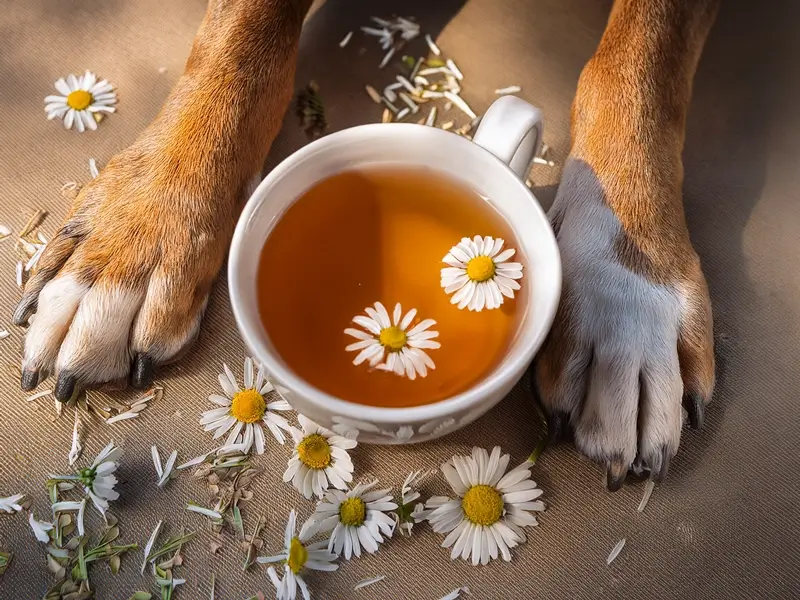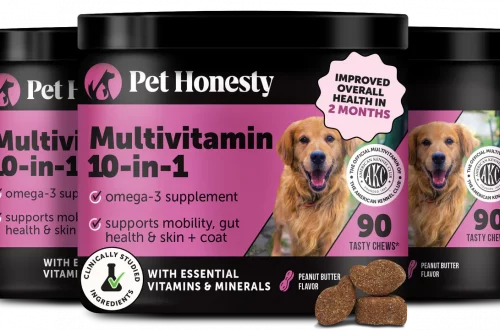In the world of natural remedies, few plants evoke the image of tranquility quite like chamomile. With its delicate daisy-like flowers and apple-scented blooms, this ancient herb has soothed humans for centuries—think of that steaming cup of tea after a long day. But what about our four-legged companions? Can chamomile offer the same gentle embrace to dogs, helping with everything from tummy troubles to thunderstorm jitters? As it turns out, yes—when used thoughtfully. This article explores the health benefits of chamomile for dogs, its safety profile, practical ways to incorporate it, and essential precautions to keep your pup wagging happily.
What Makes Chamomile a Canine Superstar?
Chamomile, scientifically known as Matricaria recutita (German chamomile) or Chamaemelum nobile (Roman chamomile), is packed with bioactive compounds like terpenoids, flavonoids, and antioxidants such as apigenin and chamazulene. greatpetcare.com +1 These elements give it anti-inflammatory, antispasmodic, antimicrobial, and mild sedative properties, making it a versatile ally for dog health. Unlike synthetic sedatives, chamomile works subtly, promoting relaxation without heavy drowsiness.
For dogs, chamomile isn’t just folklore—emerging research and veterinary insights highlight its role in supporting everyday wellness. It’s one of the safest herbs for pets, often recommended for mild issues before escalating to medications.
The Top Health Benefits of Chamomile for Dogs
Chamomile’s magic lies in its ability to address multiple canine concerns naturally. Here’s a breakdown of its key perks:
| Benefit | How It Helps Dogs | Supporting Evidence |
|---|---|---|
| Calming Anxiety and Stress | Eases nerves during fireworks, vet visits, or separation; promotes better sleep without grogginess. | Terpenoids and flavonoids induce mild sedation, reducing fear responses. greatpetcare.com +1 |
| Digestive Support | Soothes upset stomachs, reduces spasms, gas, and vomiting; aids inflammatory bowel issues. | Antispasmodic effects relax gut muscles, easing indigestion. thepetgourmet.com +1 |
| Skin and Coat Relief | Calms itchy, inflamed skin; promotes wound healing and fights minor infections. | Antimicrobial and anti-inflammatory properties soothe dermatitis and hot spots. blog.adoredbeast.com +1 |
| Anti-Inflammatory Boost | Reduces overall inflammation, potentially supporting joint comfort and heart health. | Flavonoids combat free radicals, lowering risks of chronic issues. iheartdogs.com +1 |
| Antioxidant Protection | May lower cancer risks and aid blood sugar control; supports eye health. | Apigenin fights oxidative stress, beneficial for diabetic or aging dogs. bonza.dog +1 |
These benefits make chamomile a go-to for holistic pet care, especially for dogs prone to stress or minor ailments. One study even noted its efficacy in treating canine otitis externa (ear infections) alongside traditional therapies.
Chamomile Safe for Dogs?
The Scoop on Safety
The short answer: Yes, chamomile is generally safe for dogs when dosed correctly and sourced properly. Veterinary sources like VCA Animal Hospitals endorse it as a mild supplement for sedation and inflammation.
However, moderation is key—overdoing it can flip benefits into risks.
Potential Side Effects
While rare at proper doses, watch for:
- Mild Reactions: Vomiting, diarrhea, or drowsiness.
- Allergic Responses: Itching, swelling, or breathing issues, especially in dogs sensitive to the daisy family (Asteraceae).
- Severe Toxicity: Excessive or prolonged use may cause internal bleeding or hypersalivation due to compounds like anthemic acid.
The ASPCA lists chamomile as toxic in large amounts, reinforcing the need for caution.
Pregnant or nursing dogs should skip it, as it may trigger uterine contractions.
How to Give Chamomile to Your Dog: Dosage and Methods
Always consult your vet before starting—dosage varies by weight, age, and health.
Opt for organic, dog-specific products to avoid contaminants.
Recommended Dosages (General Guidelines)
| Dog Size/Weight | Tea (Cooled, Unsweetened) | Tincture (Glycerin-Based) | Frequency |
|---|---|---|---|
| Small (<20 lbs) | 1 tsp | 0.25 ml | 1-2x daily |
| Medium (20-50 lbs) | 1-2 Tbsp | 0.25-0.5 ml | 1-2x daily |
| Large (>50 lbs) | 2 Tbsp | 0.5 ml | 1-2x daily |
Sources: Adored Beast, Great Pet Care
Brewing Tea: Steep 1-2 tsp dried flowers (or 1 bag) in 1 cup hot water for 5 minutes; cool completely. No caffeine or additives!
- Topical Use: Dilute tea as a rinse for skin; apply 2-3x daily.
- Supplements/Treats: Easiest option—look for vet-formulated chews with chamomile plus CBD or L-theanine for extra calm. petreleaf.com
Start low and monitor for 24 hours. For chronic issues, pair with behavioral training or vet-prescribed aids.
Precautions: When to Pause and Consult a Pro
Chamomile shines for mild concerns, but it’s no cure-all. Avoid if your dog:
- Has daisy allergies.
- Takes blood thinners (it may enhance effects).
- Is on sedatives (additive drowsiness risk).
Human teas often contain harmful blends—stick to pet-safe sources.
If symptoms persist (e.g., severe vomiting), seek immediate vet care.
Wrapping Up: A Soothing Sip for Your Sidekick
Chamomile isn’t a magic bullet, but its gentle profile makes it a paw-some addition to your dog’s wellness toolkit—calming minds, settling stomachs, and healing skin with nature’s finesse.
holistapet.com By starting slow, dosing smart, and looping in your vet, you can help your furry friend unwind and thrive. Next time Fido’s pacing during a storm, brew up some chamomile magic (puppy-sized, of course). Your dog—and your sanity—will thank you.





